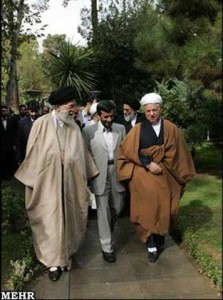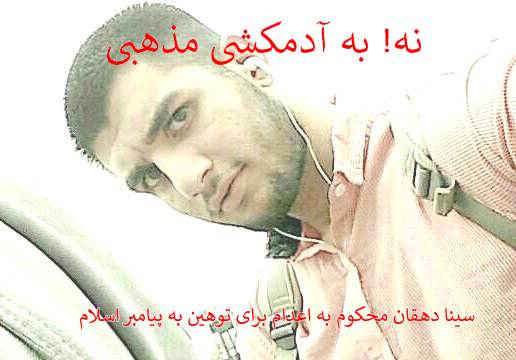
Akbar Hashemi Zefsanjani, the reformist candidate in the 2013 elections, Mahmoud Ahmadinejad, and Ali Khamenei. Image from Mehr News Agency.
Fighting between voters and boycotters escalates again on the eve of the elections. Voters argue in the same way as in previous cycles, that when the country is in a bad situation, the election of a moderate president will help moderate the situation and ease economic and political pressures. On the other hand, the boycotters believe that the Islamic Republic's sham elections — In addition to being factional and closed, it has been done with fraud for more than thirty years, and in the last round, it was held in a completely orderly manner and at the cost of the blood of several hundred Iranian people — It lacks the necessary minimum requirements for people's participation, so participation in such elections has no other result than to give the Islamic system popular legitimacy.
Both the voting and boycotting groups believe that their own views are preferable to those of the other side, and that their opposing front either does not understand the current situation in the country or is fundamentally traitorous and biased. Both sides believe that their participation or non-participation is going to be a major political move, which will have a huge impact on the future of the country. Voters insist that voting for their preferred candidate is to the detriment of the government because the candidate of the opposition faction will not win. The boycotters also believe that their vote is not only fruitless to the system of honor and authority (Legitimate power) gives what it lacks today. What makes all these disagreements meaningless is their repetition over and over again in the past years. Voters in different periods voted for their own candidates in the hope of change, and the boycotters boycotted the elections in different periods, and in the end, the situation of our country has deteriorated day by day. Neither the voters' vote has brought about a significant change in the conditions of our country over the past few decades, nor has the boycott of the elections been able to untie the knots of the country. Elections in the Islamic system are an insignificant phenomenon and at best a fight between the mafia within the power for more resources, in which participation or non-participation will not in itself bring about any fundamental change. As a rule, we cannot hope to repeat the same behavior under the same conditions for years and decades and get different results.
امید به تغییرات آسان و بی دردسر از طریق انتخابات، در جامعه ایران کارکرد افیونی دارد و مانع شکل گیری جنبشهای مردمی می شود. مردم ایران ترجیح می دهند، بجای طرح خواسته های مشروع از طریق شکل دهی جنبشهای مدنی و اعتراضات عمومی — که راه منطقی طرح چنین خواسته هایی است — فرا رسیدن یکبار انتخابات دیگر را به انتظار بنشینند تا شاید یکبار برای همیشه معجزه ای رخ دهد؛ غافل از اینکه این امامزاده که قبلا شفا نمی داده اینبار هم شفا نخواهد داد. همه ما خیلی خوب می دانیم که تغییرات واقعی چگونه شکل می گیرند؛ حتی اگر در ظاهر مخالفت کنیم و حتی اگر شهامت بیان حقیقت را نداشته باشیم. تحولات سیاسی در ایران راه حل آسان و میانبر ندارند. متاسفانه فرصت های ملت ایران برای ایجاد تحول یکی پس از دیگری از دست می روند و تاریخ هم هیچگاه معطل یک ملت بازنده نمی ماند.
امروز جمهوری اسلامی در ابتدای راهی قرار دارد که سالها پیش کشورهایی همچون کره ی شمالی طی کردند؛ در پایان این راه، چیزی به نام ملت ایران و چیزی به نام جامعه ی مدنی ایرانی در درون کشور باقی نخواهد ماند که بخواهد تحولی ایجاد کند. بهتر است پیش از اینکه دریغ و افسوس این روزها و فرصت های از دست رفته را بخوریم به فکر چاره باشیم.
 饲料
饲料 Ssl
Ssl 我的 YouTube
我的 YouTube
 部分:
部分:  标签:
标签: 
اين تركهاي خر خيلي تو انتخابات شركت مي كنند احمقا از همه همه خائن تر و خنگ تر همينها هستند بيشرفاي وطن فروش احمق
显示